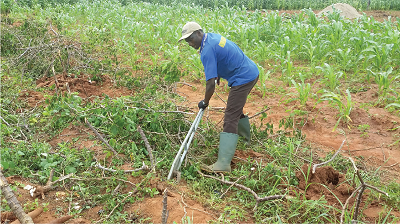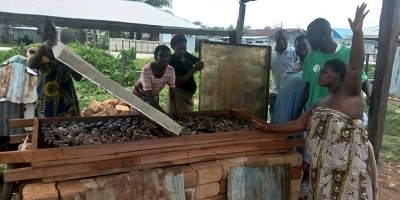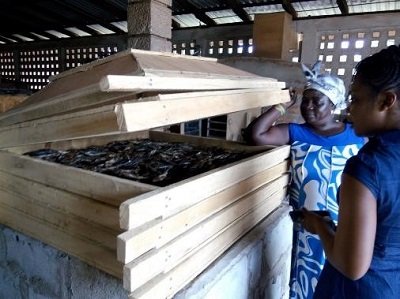News
Fact sheet about agric equipment and machines in Ghana

It is interesting to note that:
- Improved manual cassava harvester was released in 2017. Harvesting, one of the serious bottlenecks in the cassava production value chain, has received little attention in terms of mechanization. Earlier attempts at mechanising cassava harvesting have been challenged mainly by inappropriate method of planting, field topography and scale of cultivation.
Developing and adopting simple but efficient energy-saving manual harvesting tools and equipment is a sure way forward in overcoming these challenges in cassava harvesting. The cassava harvesting tool was constructed with the idea of reducing drudgery due to waist bending associated with existing manual harvesting tools which usually leads to waist pains and other bodily weaknesses.
The equipment is suitable for all cassava growing ecologies in Ghana. The improved hand-held tool can harvest cassava twice as fast with half the effort required when using existing manual harvesting options. Farmers have increased their production area and yield by 15-25 per cent after being introduced to the harvester.
• Ahotor oven for fish smokers in Delta State
- Recirculating aquaculture technology was released in 2015. Simple raised tanks that can be set in the backyard with minimal skill requirement. This technology is an aquaculture system composed of a raised tank structure (rectangular, circular or ellipsoid) made of either a cement block or wooden frame and lined with a canvas material to make. It is applicable to all cassava growing parts of the country. It can be done in homes.
- New oven for smoking fish (AFSMO-150)/ Ahotor stove was released in 2007. A brick oven which reduces tar deposition on smoked fish with increased fish smoking capacity. Ahotor stove is applicable in all fishing communities in Ghana. It is less laborious to operate, has higher smoking capacity, it is more economical to use because it consumes less fuel, and it deposits less tar on the fish and, therefore, produces better quality smoked fish.
- Improved Chorkor smoker (AFSMO) was released in 2005. This technology is to help to reduce Poly-aromatic Hydrocarbons (PAHs) in smoked fish and reduce the drudgery involved in the other means of smoking fish. The use of fuel wood is reduced. Chorkor smoker is applicable in all fishing communities in Ghana. It reduces PAH in smoked fish which makes it healthy.
- Flash Dryer– drying of root crops cakes, was released in 2004. A typical flash-drying process consists of a modified pneumatic conveyor in which the wet solids are introduced. They go through a chute where they are transported in a high velocity hot air stream. Particles fall under high velocity and pressure through a cyclone (in some instances 2, 4 or 6 cyclones). Thermal contact time between the conveying air and the solids is usually very short and, therefore, flash dryers are most suitable for removal of external moisture.
It is applicable in all parts of the country. Compared to solar drying (two days for drying) and cabinet drying (12-15hrs), the flash dryer dries one ton of cassava (for example) in 1hr 30mins. Flash dryer dries in a flash. Flash Dryer is fast, and temperature build-up after an hour is enough to keep on drying without fuel. It can utilise either LPG or diesel in operating. Capacity is between 250- 500kg/hr output 7. It requires little oversight after temperature build-up
Source: Manual of Agricultural Technologies developed by
CSIR, MAG and MoFA
Page: 133-136
News
Gender Ministry holds fourth quarter advisory board meeting

The Ministry of Gender, Children and Social Protection (MoGCSP) has held its Fourth Quarter Ministerial Advisory Board Meeting to review progress, discuss key policy matters, and strengthen collaboration towards achieving its strategic goals.
The meeting brought together members of the Advisory Board, which was set up under Section 39 of the Civil Service Act, 1993 (PNDCL 327), and the Civil Service (Ministerial Advisory Board) Regulations, 2010 (L.I. 1961).
The Board serves as a platform for continuous engagement between the Ministry and its stakeholders.
Its role is to advise the sector Minister on policy planning and implementation, while ensuring that programmes on gender, social protection, and child welfare align with national priorities and government development goals.
The Minister for Gender, Children and Social Protection, Dr. Agnes Naa Momo Lartey, commended the Board for its consistent support and technical guidance in advancing the Ministry’s mandate.
She noted that the Ministry’s work in promoting gender equality, protecting the vulnerable, and ensuring the welfare of children and families depends on strong policies and effective partnerships.
Dr. Lartey stressed that the Advisory Board plays an important role in helping the Ministry deliver its mission in a sustainable and impactful way.
A major highlight of the meeting was a presentation on the Ministry’s achievements so far this year, followed by discussions on future policy direction and strategic focus areas.
By: Jacob Aggrey
News
Speaker Bagbin elected chairperson of inter-parliamentary union Africa group

The Speaker of Parliament, Alban Sumana Kingsford Bagbin, has been unanimously elected as the Chairperson of the Africa Geopolitical Group of the Inter-Parliamentary Union (IPU).
The election took place on October 19, 2025, during the ongoing 151st IPU Assembly in Geneva, Switzerland. His victory places Ghana at the center of continental and global parliamentary diplomacy.
With this new role, Speaker Bagbin will coordinate and harmonize Africa’s collective positions on major IPU decisions and policies.
He will also serve as the continent’s chief representative on key issues such as governance, peace, security, and sustainable development.
Speaker Bagbin currently serves as the President of the Conference of Speakers and Presidents of African Legislatures (COSPAL) and is the immediate past Chairman of the Commonwealth Parliamentary Association (CPA) International.
In his remarks after the election, he thanked African delegations for their confidence and unity, particularly commending Nigeria for seconding his nomination and Senegal for withdrawing its candidate in the spirit of cooperation.
He pledged to strengthen collaboration among African parliaments and promote transparency, democratic governance, and sustainable development through stronger legislative institutions.
He succeeds Ms. Angela Thokozile Didiza, Speaker of South Africa’s National Assembly, who served with distinction.
The Africa Geopolitical Group, formed in the early 1950s, serves as a continental branch of the IPU, ensuring fair representation of African countries in the Union’s committees and decision-making bodies.
It also coordinates Africa’s common positions on major parliamentary issues discussed at IPU assemblies.
By: Jacob Aggrey







